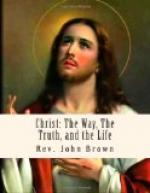CHAPTER III.
How Christ is the way in general, “I am the way.”
We come now to speak more particularly to the words; and, first, Of his being a way. Our design being to point at the way of use-making of Christ in all our necessities, straits, and difficulties which are in our way to heaven; and particularly to point out the way how believers should make use of Christ in all their particular exigencies; and so live by faith in him, walk in him, grow up in him, advance and march forward toward glory in him. It will not be amiss to speak of this fulness of Christ in reference to unbelievers, as occasion offereth, because this will help to clear the other.
Before we can clear up how any can make use of Christ, we must speak something of their necessity of him, and of his being furnished fitly, fully, richly, and satisfyingly for their case; and this will make the way of use-making of Christ more plain.
While Christ then says, “I am the Way,” he points out those things to us:
1. That man is now estranged from the Lord, and in a wandering condition: He hath departed from God, he is revolted and gone. “They are all gone out of the way,” Rom. iii. 12. “They go astray as soon as they are born, speaking lies,” Psal. lviii. 3.
2. Nay, not only so, but we love naturally to wander and to run away from God, as Jeremiah complaineth of that wicked people, Jer. xiv. 10. Naturally, with “the dromedary, we traverse our ways,” Jer. ii. 23, and run hither and thither, but never look towards him. Nay, we are like those spoken of, Job xxi. 14. “We desire not the knowledge of his ways, we will have none of him,” Psalm lxxxi. 11; nor “of his reproofs,” Prov. i. 30.
Oh, how sad is this! And yet how is it more sad, that this is not believed, nor once considered. And that it is not believed, is manifest; for,
1. How rare is it to meet with persons that are not very well pleased and satisfied with themselves and their condition? They thank the Lord it was aye well with them. They have no complaints. They see no wants nor necessities. They wonder what makes folk complain of their condition, of their evil heart, or of their hazard and danger. They understand not these matters.
2. Do we not find people very quiet and at rest, though they remain in the congregation of the dead, Prov. xxi. 16. They sleep in a sound skin, because they see no hazard. The thoughts of their condition never bereave them of one night’s rest: No challenges have they; all is at peace with them, for the strong man keeps the house.
3. How rare is it to find people exercised about this matter, and busied with it in their thoughts, either while alone, or while in company with others; or once seriously thinking and considering of it, yea, or so much as suspecting the matter?




